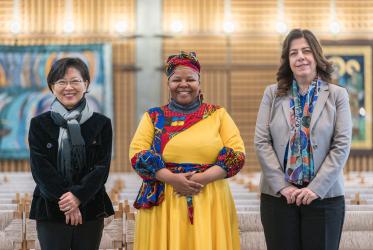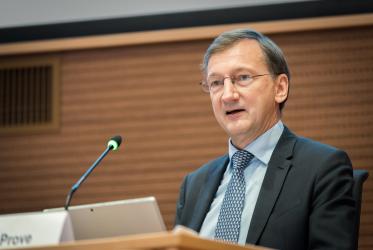Churches seeking reconciliation and peace
| World Council of Churches CENTRAL COMMITTEE Potsdam, Germany 29 January - 6 February 2001 |
We greet you in the name of our Lord and Savior, Jesus Christ!
"May the God of hope fill you with all joy and peace in believing, so that you may abound in hope by the power of the Holy Spirit." Romans 15.13.
We gather to launch the Decade to Overcome Violence: Churches Seeking Reconciliation and Peace 2001-2010 at the end of one violent century to generate hope for the redemption for the new one we now enter. We come together from the four corners of the earth aware of the urgent need to overcome violence that pervades our lives, our communities, our world, and the whole created order. We launch this decade in response to a deep yearning among our peoples to build lasting peace grounded in justice.
We launch this decade in a spirit of repentance that as Christians we have been among those who have inflicted or justified violence. We also know violence as its victims and give thanks to God for the faithful witness of Christian martyrs.
We launch this decade in conjunction with the United Nations who proclaimed the years 2001-2010 "International Decade for a Culture of Peace and Non-Violence for the Children of the World".
As one of the most violent in human history, the twentieth century has borne witness to:
- Wars of aggression and decades of colonialism and occupation of others� lands.
- World wars, hot and cold, that gave rise to nuclear and other weapons of mass destruction that still threaten global annihilation.
- A new proliferation of local and regional wars within and between nations that unleash indiscriminate weapons of ever expanding destructive impact on civilian populations, that proliferate small arms across entire societies, that press children into military service, and that uproot millions from their families and homes.
- Acts of genocide, the continued assault on Indigenous Peoples, and the persistent assertion of racial and ethnic domination that leads to new forms of discrimination, and oppression within and between societies.
- The resurgence of old, unresolved hatreds and the creation of new spirals of retributive violence between communities and peoples.
- The quick resort to violent behavior in conflicts between and within communities as well as within families and among individuals, resulting in domestic and other forms of violence, with severe consequences particularly for women, youth, and children.
- The growth and institutionalization of global systems of trade, finance, and production that concentrate power and wealth, plunder the creation, widen the gap between rich and poor, consign many across the world to debt bondage and lives of poverty, undermine the willingness and capacity of many national governments to defend the basic economic, social and cultural rights of their inhabitants, and perpetuate economic violence.
- The concentration and growth of global media that promote addiction to the consumption of violence as a form of entertainment, thus deepening a growing spiritual malaise within and across societies.
- The global spread of a consumerist culture that intensifies the exploitation of people and nature.
- The frequent invocation of religious traditions, including Christianity, to justify and promote violence and oppression.
Despite all this, by the grace of God, the last one hundred years also witnessed remarkable achievements in numerous arenas. Faithful people everywhere now have opportunity to use significant accomplishments in communications, transportation, science and other areas to end the violence and to promote life in all its fullness for all people everywhere.
Dedicated individuals, organizations and movements throughout the last century, including those committed to nonviolence, inspire us to carry forward their remarkable work for the elaboration of new global standards of law and behavior, the building of international instruments of cooperation on the basis of democracy and the rule of law, the development of peacemaking initiatives, the pursuit of economic and social justice for all, and the safeguarding of creation. They give us real hope for non-violent social change.
We thank God especially for significant advances during the last century in the search for Christian unity. These include the founding of the World Council of Churches, itself inaugurated in the aftermath of two world wars, the creation of ecumenical organizations around the world, and the healing of some long-standing divisions between churches. We pledge to continue to build on this progress in the pursuit of peace with justice.
Our inspiration springs from our faith in and personal relationship with Jesus Christ, the Lord, the Prince of Peace (Isaiah 9:6), who is continuously present and "is the same yesterday, today and forever" (Hebrews 13.8). He reconciled us to God and with each other, proclaiming peace (Ephesians 2:14-17; 2 Corinthians 5:18) and a new relationship between those who had been separated by alienation and hostility. Our endurance in the midst of violence and our renewed power for overcoming violence come from the unceasing breath of the Holy Spirit in our hearts in the life of the church. To those who are incorporated in Christ, the Holy Spirit gives power to live according to Christ�s model.
In the Decade to Overcome Violence: Churches Seeking Reconciliation and Peace, we must begin with ourselves, with the ways we think and the ways we act in our families, our neighborhoods, our countries, and our churches. The real strength of the church remains in the seeming powerlessness of love and faith. We must seek everyday to rediscover and experience this power. Overcoming violence calls and challenges us to live out our Christian commitment in the spirit of honesty, humility, and self-sacrifice.
At this critical juncture in history, we launch the Decade to Overcome Violence: Churches Seeking Reconciliation and Peace as an urgent call to churches and ecumenical organizations:
- To be and build communities of peace in diversity, founded on truth.
- To repent together for our complicity in violence.
- To work together for peace, justice and reconciliation as a visible sign of the churches� unity in life and witness.
- To analyse different forms of violence and their interconnection.
- To engage in theological reflection to overcome the spirit, logic and practice of violence.
- To work to break the cycles of violence.
- To embrace creative approaches to peace-building within the Christian tradition, local communities, secular movements, and other living faiths.
- To lead the churches to life affirming and transforming action.
- To stand alongside victims of violence and to seek to empower those people who are systematically oppressed by violence.
- To act in solidarity with those who struggle for justice, peace and the integrity of creation.
We open our hearts and extend our hands to all those eager to work together to end violence and build lasting peace with justice. In the full knowledge that God reigns supreme over all for good and is ever present amongst us in Jesus Christ and through the Holy Spirit, we pray together for the new creation God promises to us.
And on this occasion of the global launch the Decade to Overcome Violence: Churches Seeking Reconciliation and Peace at the dawn of the new century, we pray in the words of St. Basil the Great (4th Century),
Our spirit seeks you in the early dawn, O God,
for your commandments are light.
Teach us... your righteousness
and make us worthy to follow your commandments
with all our strength.
Take away from our hearts every darkness.
Grant to us the Sun of righteousness
and protect our lives from any bad influence
with the seal of your most Holy Spirit.
Direct our steps to the way of peace
and grant to us that every morning may be peaceful
so that we may send up... hymns
to you the Father and the Son and the Holy Spirit,
the only God,
who is more than without beginning...
and creator of all. Amen.




